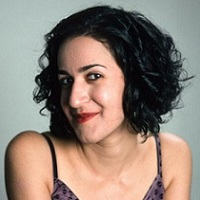The hundreds of Jews who packed the pews of Manhattan’s Town and Village Synagogue on Tuesday morning all had very different relationships to Judaism. Some of the women had wrapped themselves in traditionally male religious garments like tallit and tefillin, and others had not. Some wore long skirts, and others wore rain-soaked jeans. There were white-haired women leaning on walking sticks, students from a nearby elementary school, and infants strapped to their fathers’ chests. But they all had the same huge smile plastered to their faces.
According to Hallel Silverman—comedian Sarah Silverman’s teenaged niece, who made headlines last month when Jerusalem police arrested her for praying in a tallit with Women of the Wall—that’s because they were all united by a common goal. “This was hundreds of people with different beliefs coming together to fight for one thing they all have in common—Jewish equality,” she told me after the service. She and the other participants had come to pray in solidarity with Women of the Wall, who have been engaged in a decades-long battle with the Israeli government over whether and how they are allowed to pray at the Western Wall, one of Judaism’s holiest sites.

The most striking thing about today’s service wasn’t just its size—over 450 people—nor its location—New York City instead of Jerusalem—but the new way people were talking about Women of the Wall’s activities. After years of shying away from their critics’ charge of willful provocation, it seems these women have finally stopped viewing “provocation” as a dirty word. They’re wearing it as a badge of honor—literally, in the case of those who donned buttons proclaiming that “women should be seen and heard”—and they’re accepting their status as activists, embracing the narrative of civil disobedience, and making an effort to attract the star support and media attention they need to further their goals.The younger women seemed especially keen to embrace this new rhetoric. “The service had the air of a protest,” Miriam Cantor-Stone, an intern at Lilith Magazine, told me after the gathering wrapped up. “But without the hostility you usually see at protests.” She was exactly right: between the buttons, photographers, speeches, applause, and high-fives, it really did feel like a protest—but a joyful one. There were shouts of “We have been patient, and we’re done being patient!” and “The time has come!” But there was also singing and guitar strumming and—inevitably—a circle dance. And Cantor-Stone was glad, because it made her feel that, after all these years, “Women of the Wall is finally standing up. Thank God!”
This morning’s service, which aimed to fight for religious pluralism, also modeled it. Among the hundreds of male allies who came to support Women of the Wall were Orthodox leaders who, though they disagreed with some of the women’s practices, nevertheless advocated for their right to pray where and how they please. “This is a civil rights issue, and it is an issue of separation of religion and state,” Rabbi David Kalb told the crowd to loud applause. “When violence is being done by so-called ultra-Orthodox Jews, it is the job of Orthodox Jews in Israel to put themselves between these violent protestors and these women who wish to pray to God.”
In Israel, though, it’s not only Orthodox Jews who are putting themselves between these women and those who want to shut them down. This morning, the Jerusalem-based Women of the Wall also met for a prayer gathering, and were joined by three female Members of Knesset—Tamar Zandberg (Meretz), Stav Shaffir (Labor) and Michal Rozin (Meretz)—who used their parliamentary immunity to make it into the Western Wall plaza wearing prayer shawls. As the Jewish Week reported today, their presence made the police think twice about arresting any of the women this time around, and “that’s exactly what Women of the Wall had hoped would happen when they sent the female MKs an invitation.” The fact that the group took the step of inviting these MKs is encouraging, because it shows they’re starting to think strategically about how to enlist high-profile supporters in service of their goal.
What’s more, the way these MKs spoke about Women of the Wall shows that the group’s revamped rhetoric is permeating the public discourse. “I am a secular woman, this is the first time I have worn a prayer shawl, but I came in solidarity with this feminist struggle,” Zandberg said. Shaffir tweeted, “It’s my duty to protect the rights of all to pray as they desire and believe.” Both clearly view this as a feminist and civil rights issue—one that’s on the right side of history—and the Israeli press, it seems, is not far behind. Over at 972, Mairav Zonszein, like Cantor-Stone, referred to today’s gathering as a “protest.”
Hallel Silverman believes these developments, along with American Jewish shows of solidarity like the one that took place today, will effect change in Israel. “I think international pressure is the best thing we could do right now,” she said. “More of these prayer services, or rallies, or whatever you want to call them. The more it spreads, the bigger it gets. The Israeli government isn’t going to have a choice soon.”






